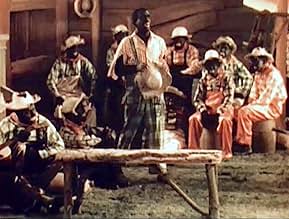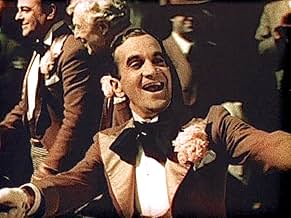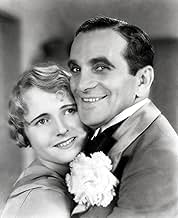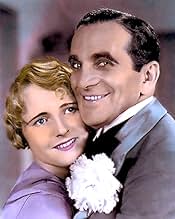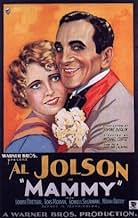Füge eine Handlung in deiner Sprache hinzuA love triangle develops in a traveling minstrel troupe.A love triangle develops in a traveling minstrel troupe.A love triangle develops in a traveling minstrel troupe.
Allan Cavan
- Doctor
- (Nicht genannt)
Richard Cramer
- Detective
- (Nicht genannt)
Stanley Fields
- Pig Eyes
- (Nicht genannt)
Lloyd Ingraham
- Deputy Sheriff
- (Nicht genannt)
Ben Taggart
- Sheriff
- (Nicht genannt)
Grant Withers
- Reporter in Trailer
- (Nicht genannt)
Handlung
WUSSTEST DU SCHON:
- WissenswertesA preserved print of this film survives in the UCLA Film and Television archives.
- VerbindungenFeatured in Hollywood and the Stars: The Immortal Jolson (1963)
Ausgewählte Rezension
Mammy (1930)
** (out of 4)
Al Fuller (Al Jolson) is an entertainer in a minstrel show who just happens to be in love with a woman (Lois Moran) who can't have him because she's in love with another performer (Lowell Sherman). During the act there's a sequence where Fuller must shoot the "other man" but after doing so this night a real bullet comes out. Fuller runs off to his mother who tells him he should go back and face the music. Fans of Al Jolson swear up and down that the entertainer doesn't get the credit he deserves today because of the fact that he appeared in blackface. The actor will always be remembered by film buffs for THE JAZZ SINGER but I'm going to go against some of the fans and say that he's not better remembered today not due to the blackface but because of the fact that his movies simply aren't that good. MAMMY is the perfect example of this. The performances are bad. The story is downright silly. The talking sequences are all rather lame but this can be blamed on the technology of the time. Curtiz, one of the greatest directors from the Golden Age of Hollywood, is absent throughout much of the running time. We can start with the story as it's just downright silly and it's easy to say that not much time was spent on it as the studio was clearly more worried about the music. That's understandable so we can let the bad story slide. Curtiz' direction really doesn't bring any of the material to life and just check out how poorly shot the opening sequence is in the rain. The other minstrel show stuff will probably offend most people but I've seen enough movies and know enough about history to realize that this type of thing was accepted in 1930. Still, seeing a bunch of actors in blackface singing "Yes! We Have No Bananas" is probably going to be too much. The music numbers are the only thing that makes this worth viewing as there's no question that Jolson has a terrific voice and it can be heard in some great songs including "Yes, Sir, That's My Baby," "Mammy," "In the Morning," and several others. Jolson does his best to keep the energy going but he's given some pretty poor dialogue including some really lame jokes. The supporting players don't help too much either but then again the screenplay isn't doing them any favors. MAMMY is probably best known for the two sequences shot in 2-strip Technicolor. The picture quality today is quite rough but at the same time I was rather shocked at how incredibly bad the blackface looked in color. It looks like they would have done some more tests because just take a look at it during the first color number.
** (out of 4)
Al Fuller (Al Jolson) is an entertainer in a minstrel show who just happens to be in love with a woman (Lois Moran) who can't have him because she's in love with another performer (Lowell Sherman). During the act there's a sequence where Fuller must shoot the "other man" but after doing so this night a real bullet comes out. Fuller runs off to his mother who tells him he should go back and face the music. Fans of Al Jolson swear up and down that the entertainer doesn't get the credit he deserves today because of the fact that he appeared in blackface. The actor will always be remembered by film buffs for THE JAZZ SINGER but I'm going to go against some of the fans and say that he's not better remembered today not due to the blackface but because of the fact that his movies simply aren't that good. MAMMY is the perfect example of this. The performances are bad. The story is downright silly. The talking sequences are all rather lame but this can be blamed on the technology of the time. Curtiz, one of the greatest directors from the Golden Age of Hollywood, is absent throughout much of the running time. We can start with the story as it's just downright silly and it's easy to say that not much time was spent on it as the studio was clearly more worried about the music. That's understandable so we can let the bad story slide. Curtiz' direction really doesn't bring any of the material to life and just check out how poorly shot the opening sequence is in the rain. The other minstrel show stuff will probably offend most people but I've seen enough movies and know enough about history to realize that this type of thing was accepted in 1930. Still, seeing a bunch of actors in blackface singing "Yes! We Have No Bananas" is probably going to be too much. The music numbers are the only thing that makes this worth viewing as there's no question that Jolson has a terrific voice and it can be heard in some great songs including "Yes, Sir, That's My Baby," "Mammy," "In the Morning," and several others. Jolson does his best to keep the energy going but he's given some pretty poor dialogue including some really lame jokes. The supporting players don't help too much either but then again the screenplay isn't doing them any favors. MAMMY is probably best known for the two sequences shot in 2-strip Technicolor. The picture quality today is quite rough but at the same time I was rather shocked at how incredibly bad the blackface looked in color. It looks like they would have done some more tests because just take a look at it during the first color number.
- Michael_Elliott
- 11. März 2011
- Permalink
Top-Auswahl
Melde dich zum Bewerten an und greife auf die Watchlist für personalisierte Empfehlungen zu.
Details
- Laufzeit1 Stunde 24 Minuten
- Farbe
Zu dieser Seite beitragen
Bearbeitung vorschlagen oder fehlenden Inhalt hinzufügen


